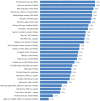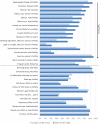Fertility Health Knowledge in U.S. Adults: Men Narrowing the Knowledge Gap
- PMID: 36112813
- PMCID: PMC9478737
- DOI: 10.1177/15579883221117915
Fertility Health Knowledge in U.S. Adults: Men Narrowing the Knowledge Gap
Abstract
Much of young people's fertility health knowledge has been limited to avoiding sexually transmitted infections and preventing pregnancy thus lacking what is necessary to support future overall health as well as reproductive goals. This study assesses university students' knowledge related to fertility health factors to verify consistencies and discrepancies in fertility health knowledge, with a sub-assessment focusing on men's knowledge. The Fertility Health Knowledge survey was delivered to 17,189 students at three American universities. Twenty percent or 546 of the 2,692 participants were male. The 30-question survey addresses knowledge of modifiable and non-modifiable risk factors on fertility health in men and women, and four questions regarding fertility intentions. Across all 30 questions, 63% of female responses were correct and 61% of male responses were correct. For 10 questions, less than 70% of males and females answered correctly, with men answering correctly more often than females for six of the questions. Males exhibited more knowledge regarding male fertility. Knowledge of fertility health was consistently limited, regardless of site or demographics. Men demonstrated improved overall fertility health knowledge and more knowledge regarding male factors. There are still considerable gaps in knowledge of modifiable risk factors that may impact fertility health and future overall health. Fertility health promotion through education should be comprehensive and widely available in secondary schools, colleges, and universities. As well, increased education regarding fertility health in primary care settings should become the norm-with male inclusion as a standard of their care.
Keywords: general health and wellness; health education; health promotion; lifestyle modification; male fertility health; male fertility knowledge.
Conflict of interest statement
Figures
References
-
- American College Health Association. (2019). American College Health Association-National College Health Assessment II. Reference group executive summary (2019). American College Health Association. https://www.acha.org/documents/ncha/NCHA-II_SPRING_2019_US_REFERENCE_GRO...
MeSH terms
LinkOut - more resources
Full Text Sources
Research Materials
Miscellaneous



